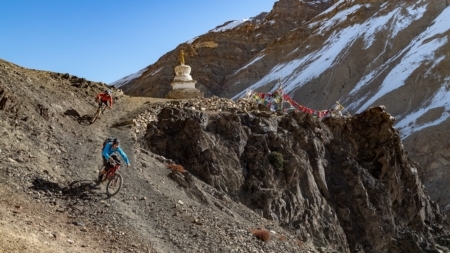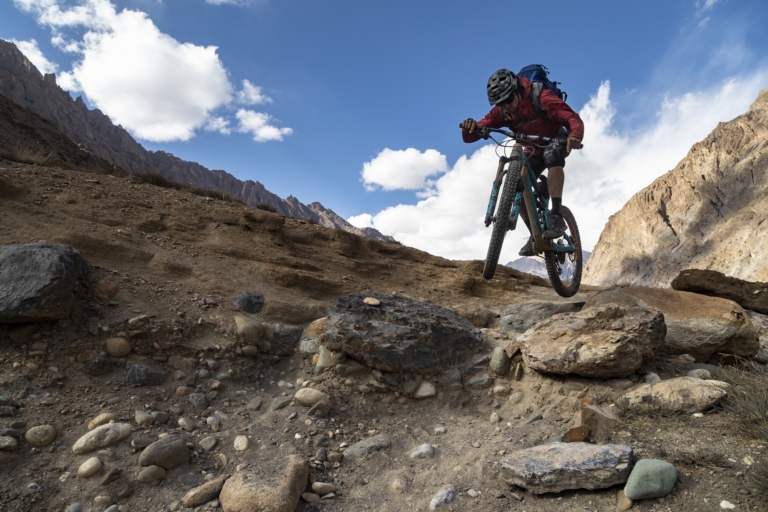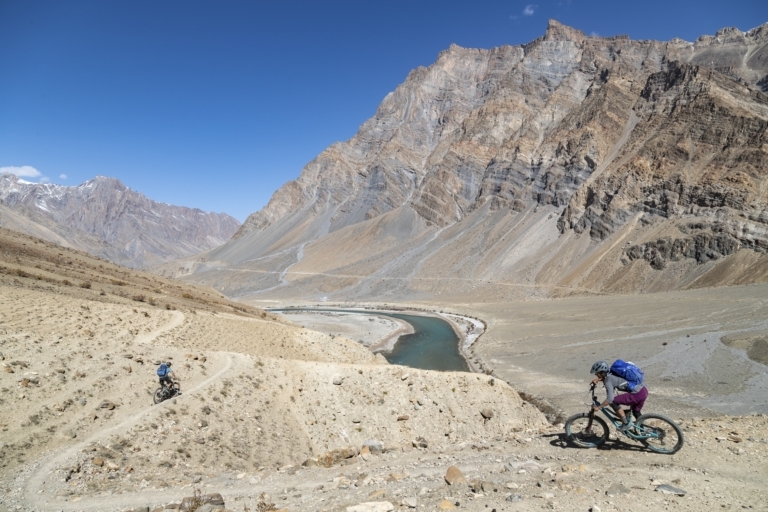New Roads in the Ancient Kingdom of Zanskar
Perched in the Himalaya and once accessible only by trail, India’s Zanskar region has remained largely free of Western influences for over 2,000 years. That could all change as a new highway brings a wave of instant globalization.
Snow-filled gusts buffeted the sides of the jeep, quickly covering the road ahead and adding a new layer of tension to the already perilous drive. The wipers ticked a steady rhythm across the windshield, a half-beat off Enrique Iglesias’s crooning from the radio. Our driver Jigmeth had been playing the pop singer’s hits since he picked us up in Leh, India, and began the 280-mile drive toward the starting point of our journey in the country’s northern mountains. It was September 22, day zero of our planned 16-day bikepacking trip, and after three hours on the road we were nearing the 17,480-foot Taglang La Pass. Our drop-off point was still several hours and two more high passes farther down the Manali-Leh Highway. We just needed to make it through the blizzard to get there.
Jigmeth likely had an idea of the widespread destruction the snowstorm would cause; the road closed a few hours later, leaving him trapped on the wrong side of the pass for five days until workers were able to clear it. We, however, brushed the storm aside as a mere inconvenience. I blame it on the naiveté of beginning a journey, but it should have been obvious considering our destination was one of the most inaccessible areas on earth: the former Buddhist kingdom of Zanskar.
Perched among the dizzying heights of the Tibetan Plateau, ensconced in glaciated, 23,000-plus-foot peaks, and sharing heavily patrolled borders with both China and Pakistan, most Zanskari villages have remained accessible exclusively via ancient trail networks, some requiring multiple days’ worth of walking. There is one road, a single-lane 4×4 track to the capital city of Padum, but it’s impassable seven months of the year due to snowfall. In the winter, the only way in or out is by foot along the partially frozen Zanskar River.
Yet, despite this extreme isolation, the Zanskari people have called the mountainous, high-altitude desert home for over 2,500 years—and, due to the inaccessibility, Zanskar’s unique culture has remained largely free of Western influences.
That’s all changing as the Indian military constructs the first year-round highway up the Zanskar River, providing access to almost every village. This instant globalization brings with it amenities like modern medicine, better access to education and upgraded infrastructure. It’s also a shock to the Zanskari culture, which, following the Chinese annexation of Tibet, is considered one the world’s last bastions of Tibetan Buddhism.
The clashing of new versus ancient is what brought Carston Oliver, Nichole Baker, Eric Porter and me to Zanskar, careening up a mountain pass in the middle of a blizzard. We wanted to see the new highway’s continuing impact on the region…and ride Zanskar’s ancient trails before they were abandoned in favor of faster, more reliable modes of travel.
Back in the jeep, a colorfully painted, prayer-flag-festooned concrete pillar marked the summit of the pass. We hopped out to take pictures in the blizzard, completely unaware that in a few days the same storm would force us off those trails, to seek refuge on the very highway we were trying to avoid.










